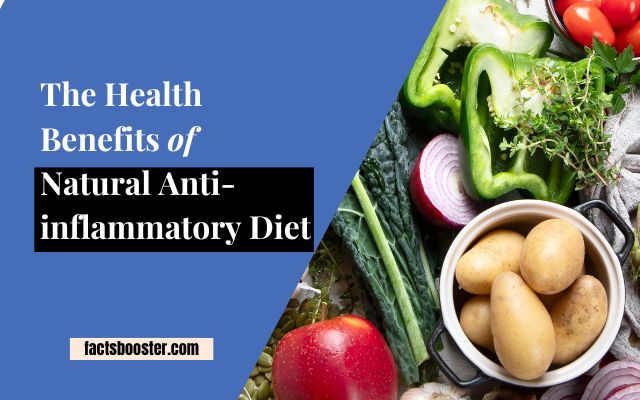So, you’re curious about the buzz surrounding natural anti-inflammatory diets and wonder if it’s the missing piece in your quest for optimal health? Let’s dive in. The food you eat does more than just fill your belly; it can be your best ally in the fight against inflammation.
In a world where inflammation-related diseases lurk at every corner, adopting a diet rich in natural anti-inflammatory foods isn’t just smart; it’s essential. By embracing foods that naturally reduce inflammation, you’re setting the stage not only to fight inflammation but also to shield yourself against a host of chronic diseases.
Key Takeaways:
- Reduce inflammation naturally with dietary choices
- Fight inflammation and prevent chronic diseases
- Natural anti-inflammatory diet: A crucial step towards better health
Understanding Inflammation

When you think about it, inflammation is like your body’s built-in alarm system. It kicks into gear the moment anything harmful invades, aiming to protect and heal you. However, this protective measure operates on two distinct levels: acute and chronic inflammation.
Acute inflammation is your body’s immediate and temporary response to an injury or infection. It’s what causes the redness and swelling around a cut or the fever that fights off infection – essentially, a sign that your body is fighting the good fight.
On the other hand, chronic inflammation lingers. It quietly simmers beneath the surface without the overt signs that acute inflammation brings. This type of inflammation can become your nemesis, contributing to a host of major diseases.
Think of conditions such as heart disease, diabetes, and arthritis, all of which have been linked to ongoing inflammation. So, while inflammation can be a hallmark of your body’s natural defense mechanism, when it shifts from acute to chronic, it becomes a key player in disease development.
Inflammatory Foods to Avoid
As you embark on the journey towards a natural anti-inflammatory diet, it’s crucial to know which foods to sidestep. Foods that promote inflammation can be detrimental to your health, potentially accelerating the process of inflammatory disease.
Sodas and refined carbohydrates, such as white bread and pastries, are major culprits, offering little nutritional value while risking your wellbeing. Similarly, red meat and processed meats, like hot dogs and sausages, not only contribute to inflammation but are also linked to chronic diseases. Replacing these foods with natural, anti-inflammatory alternatives is a positive step toward reducing inflammation and fighting inflammation in your body.
Steering clear of these inflammatory foods can vastly improve your health and reduce your risk of chronic diseases.
Read more:
Natural anti-inflammatory
Switching to a natural anti-inflammatory diet can seem daunting at first, but it’s simpler than you think. The key is to focus on foods that work to reduce inflammation and, in turn, help you fight inflammation occurring in the body.
The benefits are too good to ignore, with such a diet playing a significant role in preventing chronic diseases linked to ongoing inflammation.
First off, let’s talk about fruits and veggies. These are your best friends when it comes to combating inflammation naturally. Foods like blueberries, spinach, and kale are loaded with antioxidants and have potent anti-inflammatory effects.
Then, there are nuts and seeds – walnuts, almonds, and chia seeds, to be specific. They’re not only tasty but also packed with healthy fats that help in fighting inflammation.
Fish, especially those rich in omega-3 fatty acids like salmon and mackerel, is another powerful player in a natural anti-inflammatory diet. By incorporating these foods into your meals, you’re on the right path to fight inflammation and boost your overall health.
Fruits and Vegetables: Nature’s Anti-Inflammatory Powerhouses
When you turn your focus to a natural anti-inflammatory diet, fruits and vegetables stand out as your strongest allies. Rich in antioxidants and polyphenols, these natural wonders go beyond just adding color to your plate; they play a crucial role in fighting inflammation.
Think of blueberries, brimming with antioxidants that scavenge harmful free radicals from your body, or the humble broccoli, packed with sulforaphane, which has been shown to have powerful anti-inflammatory properties.
Including a variety of these foods in your diet is not just a treat for your taste buds, but a solid strategy in reducing inflammation. Leafy greens like spinach and kale, with their high levels of vitamins and minerals, help in this fight as well.
Omega-3 rich avocados and sweet, juicy cherries also offer significant anti-inflammatory benefits. By making these fruits and vegetables a staple in your diet, you’re harnessing nature’s power to not only reduce inflammation but also protect your body against chronic diseases associated with long-term inflammation.
Nuts, Whole Grains, and Healthy Oils
When you dive into the world of natural anti-inflammatory diets, the spotlight often shines on three champions: nuts, whole grains, and healthy oils. These are not just ordinary food items; they’re your allies in the fight against inflammation. Let’s unpack why integrating these into your diet could be a game-changer for your health.
- Nuts are like little nuggets of gold in the world of natural anti-inflammatory diets. They’re packed with healthy fats, particularly omega-3 fatty acids, which are stars in reducing inflammation. Snacking on almonds, walnuts, or even a handful of pistachios can help keep your body’s inflammation in check.
- Whole grains, contrary to their refined cousins, retain all the nutritious parts of the grain. Consuming whole grains such as quinoa, brown rice, and oats can lead to lower levels of inflammation. They help ensure a steady supply of fiber, which aids in keeping your gut health in tip-top shape, further helping to stave off inflammation.
- Healthy oils, like olive oil and avocado oil, are rich in monounsaturated fats. These oils are not just good for drizzling over your salad for that extra zing; they’re powerful components in minimizing inflammation. Olive oil, in particular, contains oleocanthal, a compound known for its anti-inflammatory effects, akin to over-the-counter remedies like ibuprofen.
By weaving nuts, whole grains, and healthy oils into your meals, you’re not just savoring their deliciousness. You’re also arming your body with the tools it needs to reduce inflammation naturally. And in the long run, this may be one of the kindest things you can do for your health.
Fish: A Deep Dive into Omega-3 Fatty Acids
Turning our focus towards the ocean’s bounty, we find fish, a remarkable source of omega-3 fatty acids, playing a pivotal role in combatting inflammation within our bodies. These essential fats are not just any nutrient; they are powerful anti-inflammatory agents.
When you incorporate fish such as salmon, mackerel, and sardines into your diet, you’re not just enjoying a tasty meal; you’re engaging in a proactive strategy to reduce inflammation and foster overall health.
Omega-3 fatty acids work by reducing the production of substances linked to inflammation, such as eicosanoids and cytokines. Studies have shown that regularly consuming these nutrient-rich sea dwellers can lead to a significant decrease in inflammation markers.
This isn’t just about fighting inflammation, it’s about embracing a lifestyle that prioritizes long-term health and well-being. By opting for a natural anti-inflammatory diet rich in omega-3s, you’re setting the stage for a body more resilient to the chronic diseases often fueled by persistent inflammation.
Creating Your Anti-Inflammatory Meal Plan
So, you’re intrigued by the idea of adopting a natural anti-inflammatory diet and are wondering where to begin? Let’s dive into the art of crafting meals that not only tantalize your taste buds but also fortify your body against inflammation.
The key lies in choosing foods rich in antioxidants, omega-3 fatty acids, and polyphenols. Here’s a simple guide to get you started:
- Morning Magic: Kick off your day with a smoothie that packs a punch – blend blueberries, spinach, and a banana with a dash of flaxseed for that omega-3 boost. Alternatively, oatmeal topped with walnuts and sliced apples offers a fiber-rich breakfast with anti-inflammatory benefits.
- Lunch Delights: For lunch, think colorful salads adorned with leafy greens, cherry tomatoes, and avocados. Add in a portion of grilled salmon or a handful of almonds for that extra dose of healthy fats.
- Evening Feast: Dinner can be a simple yet satisfying affair with whole grain pasta tossed in olive oil, garlic, and an assortment of vegetables like bell peppers and zucchini. Incorporating fish like mackerel or sardines twice a week can significantly up your anti-inflammatory game.
The journey toward reducing inflammation through diet isn’t just about subtracting; it’s about enriching your meals with natural, wholesome foods. You’ll be amazed at how these simple swaps can revitalize your body and spirit.
Lifestyle Adjustments for Enhanced Benefits
Embracing a natural anti-inflammatory diet is a fantastic start to reduce inflammation and fight inflammation, but it’s only part of the equation. Alongside tweaking your diet, incorporating additional lifestyle changes can significantly amplify the benefits.
Think of it as a holistic approach to harnessing the full power of a natural anti-inflammatory lifestyle.
- Exercise Regularly: Not only does it keep you fit, but regular physical activity is also a potent inflammation fighter. Aim for a mix of cardiovascular, strength, and flexibility exercises to keep things balanced and enjoyable.
- Quit Smoking: It might be challenging, but kicking the smoking habit is crucial. Smoking is a known inflammatory agent, so saying goodbye to cigarettes can have a profound impact on reducing inflammation levels.
- Manage Stress: Chronic stress can wreak havoc on your body and contribute to inflammation. Seek out stress-reduction techniques that work for you, whether it’s meditation, yoga, or simply spending more time in nature.
- Get Enough Sleep: Never underestimate the power of a good night’s sleep. Sleep gives your body time to repair and recover, which is essential for keeping inflammation in check.
Monitoring Your Progress
Just like tracking your progress when you start a new running routine, keeping tabs on how your body responds to a natural anti-inflammatory diet is pivotal. You’ve made the switch to reduce inflammation, fight inflammation, and ultimately give your body the best shot at warding off diseases linked with chronic inflammation.
But, how do you know if it’s working? Let me walk you through it.
- Journal Your Journey: Start by jotting down what you eat and how you feel after each meal. Do you notice less joint pain? More energy? These could be signs that your natural anti-inflammatory diet is doing its trick.
- Get Lab Savvy: Sometimes the proof is in the pudding, or in this case, your bloodwork. Tests can show markers of inflammation in your body, so speaking with your healthcare provider about tracking these over time can give you a clear picture of your diet’s impact.
- Listen to Your Body: Above all, tune into what your body is telling you. Reduced symptoms like digestive issues or chronic headaches might be signaling that you’re on the right path.
Remember, this journey is yours, and while it’s about reducing inflammation and fighting inflammation with a natural anti-inflammatory diet, it’s also about discovering what makes you feel your best.
Common Myths and Facts
When venturing into the world of natural anti-inflammatory diets, it’s not uncommon to encounter a slew of myths that can muddy the waters. Let’s clear up some confusion and shed light on the facts, ensuring you’re well-informed to reap the benefits of reducing inflammation through diet.
- Myth: All fats are bad and should be eliminated to fight inflammation.
- Fact: Not all fats are created equal. While it’s true that trans fats and saturated fats can fan the flames of inflammation, monounsaturated fats and omega-3 fatty acids found in nuts, healthy oils, and fish are your allies in the combat against inflammation. Integrating these into your diet can actually help reduce inflammation.
- Myth: A natural anti-inflammatory diet is overly restrictive.
- Fact: Far from being restrictive, an anti-inflammatory diet encourages a varied intake of whole, nutrient-rich foods. Embracing fruits, vegetables, whole grains, and lean proteins, this diet is diverse and can be easily adapted to fit personal tastes and preferences.
- Myth: Only people with chronic diseases benefit from an anti-inflammatory diet.
- Fact: While those facing chronic conditions may indeed find relief with an anti-inflammatory diet, its benefits extend to anyone pursuing improved overall health. By reducing inflammation, you’re not only tackling current health issues but also preventing future ailments.
Seeking Professional Advice
Embarking on a journey towards a natural anti-inflammatory diet is exciting, and it’s a powerful step you can take to reduce inflammation and fight inflammation in your body. However, before you dive deep into changing your meals and possibly your lifestyle, it’s crucial to involve a professional in your plans.
Just as a pilot wouldn’t take off without a route plan, embarking on significant dietary changes should involve a consultation with a healthcare provider.
Especially for those of us navigating pre-existing health conditions, the guidance of a doctor or a registered dietitian is invaluable. These professionals can offer personalized advice that ensures your new diet enhances your health without adverse effects.
Whether it’s tweaking nutritional intake to suit specific medical needs or identifying potential allergies and intolerances, their expertise makes the transition to a natural anti-inflammatory diet both safe and effective.
So, before you make the leap, make the call. Your body will thank you for taking this step with the right support guiding the way.
Bottom Line
Embrace the journey towards vibrant health by incorporating a natural anti-inflammatory diet into your daily routine. Recognize that to reduce inflammation and fight inflammation effectively, commitment to consuming foods that bolster your wellbeing is key. Make this positive shift and witness the enduring benefits of a life nourished by nature’s bounty.
References:
1. PubMed Central, 2023 Feb 22, “Effect of Nuts on Markers of Inflammation and Oxidative Stress: A Narrative Review” (1)
2. PubMed Central, 2022 Jan 16, “Whole Grain Consumption and Inflammatory Markers: A Systematic Literature Review of Randomized Control Trials” (2)
3. PubMed Central, 2014, “Avocado oil supplementation modifies cardiovascular risk profile markers in a rat model of sucrose-induced metabolic changes” (3)


